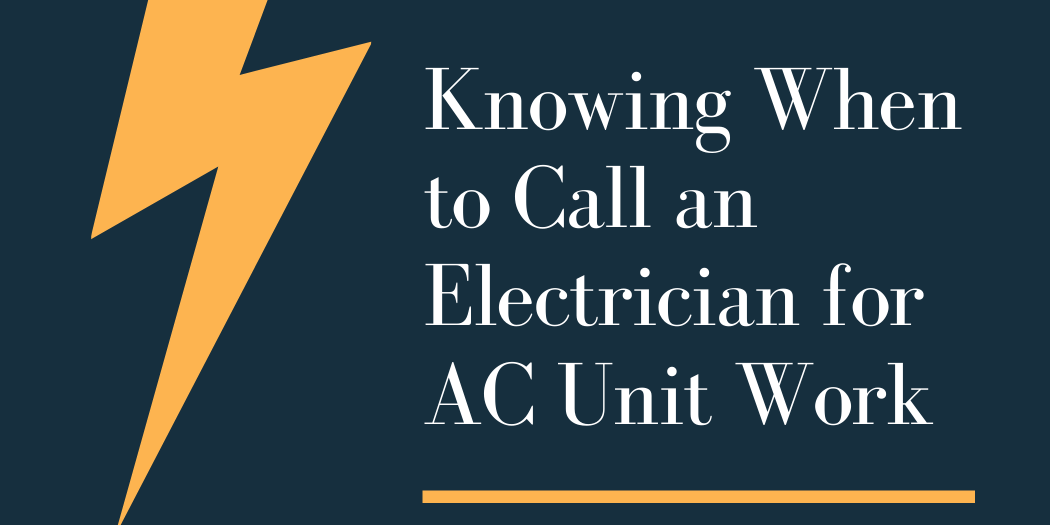Knowing When to Call an Electrician for AC Unit Work
As the temperature rises and the summer heat becomes unbearable, your air conditioning (AC) unit becomes an indispensable appliance in keeping your home cool and comfortable. However, like any other electrical system, AC units can encounter various issues that may require professional attention. Knowing when to call an electrician for work on your AC unit is essential to ensure its efficient operation, prolong its lifespan, and maintain indoor comfort. In this comprehensive guide, we’ll explore the signs and situations that indicate it’s time to seek the expertise of a qualified electrician for AC unit-related work.
Understanding the Electrical Components of Your AC Unit
Before discussing when to call an electrician, it’s important to understand the electrical components of your AC unit. While the entire system involves mechanical and refrigeration components, the electrical system is responsible for powering and controlling the unit’s operation. Key electrical components include:
1. Thermostat: The thermostat controls the temperature setting and regulates when the AC unit turns on and off.
2. Circuit Breaker: The circuit breaker protects the electrical system from overloading by shutting off power when necessary.
3. Condenser Fan Motor: This motor powers the fan that blows air over the condenser coils to dissipate heat from the refrigerant.
4. Compressor: The compressor circulates refrigerant through the AC system, transferring heat from inside to outside the home.
5. Capacitor: Capacitors provide the initial jolt of electricity needed to start the motors in the AC unit.
6. Wiring and Connections: The AC unit is connected to the electrical panel of your home via wiring, terminals, and connectors.
Signs That You Need to Call an Electrician for AC Unit Work
1. Tripped Circuit Breaker: If your AC unit repeatedly trips the circuit breaker, it indicates an electrical problem such as overloading, short circuits, or faulty wiring. While resetting the breaker may temporarily resolve the issue, persistent tripping requires professional diagnosis and repair by an electrician.
2. Faulty Wiring or Connections: Visible signs of frayed wires, loose connections, or melted insulation around wiring indicate potential hazards that can compromise the safety and performance of your AC unit. An electrician can inspect the wiring and make necessary repairs to prevent electrical fires and system malfunctions.
3. Intermittent Power Supply: If your AC unit experiences intermittent power supply or fails to turn on consistently, it may indicate issues with the electrical components such as the thermostat, capacitor, or wiring. An electrician can troubleshoot the electrical system to identify and rectify the underlying cause of the problem.
4. Unusual Sounds or Odors: Strange noises such as buzzing, humming, or sparking sounds emanating from your AC unit may signal electrical issues such as motor malfunction or electrical arcing. Similarly, foul odors such as burning plastic or musty smells could indicate overheating or wiring problems. It’s important to shut off the AC unit immediately and contact an electrician for inspection and repairs.
5. Diminished Cooling Performance: If your AC unit fails to cool your home effectively or takes longer than usual to reach the desired temperature, it could be due to electrical issues affecting the compressor, fan motor, or refrigerant circulation. An electrician can diagnose the problem and recommend appropriate repairs to restore optimal cooling performance.
6. High Energy Bills: A sudden increase in your energy bills without a corresponding increase in usage could be attributed to inefficient operation or electrical inefficiencies in your AC unit. An electrician can assess the electrical system, identify energy-wasting issues, and implement solutions to improve efficiency and reduce utility costs.
7. New AC Unit Installation: When installing a new AC unit or upgrading your existing system, it’s essential to hire a licensed electrician to ensure proper wiring, grounding, and integration with your home’s electrical panel. Professional installation minimizes the risk of electrical hazards, ensures compliance with building codes, and maximizes the longevity of your AC unit.
When to DIY and When to Call an Electrician
While some minor AC unit maintenance tasks can be performed by homeowners, such as replacing air filters or cleaning debris around the outdoor unit, electrical work should always be left to trained professionals. Attempting DIY electrical repairs or modifications can result in personal injury, property damage, and code violations. Here’s when to DIY and when to call an electrician:
DIY:
– Changing air filters
– Cleaning debris from the outdoor unit
– Checking and resetting circuit breakers (after ensuring it’s safe to do so)
– Inspecting visible wiring for signs of damage (without touching or attempting repairs)
Call an Electrician:
– Tripped circuit breakers that persist despite reset attempts
– Faulty wiring or connections
– Intermittent power supply or failure to turn on
– Unusual sounds or odors emanating from the AC unit
– Diminished cooling performance
– High energy bills
– New AC unit installation or major repairs
Final Thoughts
Knowing when to call an electrician for work on your AC unit is essential for maintaining its performance, efficiency, and safety. By recognizing the signs of electrical issues, such as tripped circuit breakers, faulty wiring, unusual sounds or odors, and diminished cooling performance, homeowners can take proactive steps to address problems promptly and prevent costly repairs or accidents. Whether it’s troubleshooting electrical malfunctions, conducting preventive maintenance, or installing a new AC unit, entrusting the job to a qualified electrician ensures peace of mind and optimal comfort throughout the sweltering summer months.







